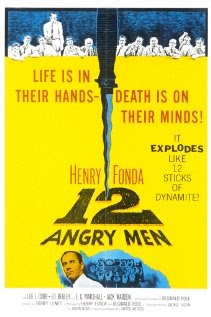In 1939 Stagecoach came out and forever changed the Hollywood western. Stagecoach marked the first collaboration between John Wayne and John Ford, a team-up that would spawn such other classics as The Searchers and The Man Who Shot Liberty Valance. This was an actor and director who clearly respected each other and enjoyed working with each other, and (better still) who brought out the best in each other.
Stagecoach broke new ground in just how stinkin' good a western could be. It is fun to watch and enjoyably paced, keeping a good balance between action, humor, and drama. It is well filmed, communicating the expansive scope of a landscape you could so easily get lost in, bringing the wide open spaces of the west into the movie theaters of the east. But just as quickly the shot will change, and what had been wide open becomes the crowded, claustrophobic, confined space of the stagecoach itself. Perhaps Ford wanted to make some statement about how we take the great big world and make it uncomfortable and crowded.
Anyway, Stagecoach also started a whole new movie archetype; it is the story of a small group of very different people who need to learn to work together in order to overcome large obstacles. This is a much-copied story today, but in 1939 it was all but brand new.
The story is simple: there is a stagecoach that must get from one town through another, in spite of the fact that Geronimo's Indians (not a politically correct term today, but I'll be using it because the movie does) threaten the wilds between the towns. On the stagecoach in question we find 9 people, all on that ride for very different reasons. The driver -the bumbling comic relief played by the John Ford staple Andy Devine -obviously he is along because it's his job, but he is sure to tell everyone he'd rather not be on that particular ride. The marshal riding shotgun has arrested the outlaw the Ringo Kid (John Wayne) and wants to take him to jail. There is a pregnant lady searching for her husband, and a notorious gambler who has offered to take her to him in safety. Then there is a traveling whiskey salesman too meek to do anything but go along with the others, and a banker who has absconded with the payroll deposit. Finally, there are two characters being run out of town; a drunk doctor and a prostitute named Dallas. Claire Trevor plays Dallas so well the character has become cliched: the hooker with the heart of gold.
These characters are played off each other brilliantly, shining a penetrating light on the dysfunctions of society's norms. Ringo immediately likes Dallas, though it is clear he is not aware of her past. Everyone but him shuns her, and he thinks it is because of HIS past. The doctor has the most to offer the group, but would rather drink than anything: evidently he regards the world a farce. Altogether, the characters that are presented as most virtuous -the "heroes," if you will -are those that society regards as dirty or untouchable. This is a movie that expertly flips our expectations and values, causing us to see all people as people, and not the pigeonhole they may have been forced into. After all, perhaps Dallas is only a prostitute because she has no other option -she might instead become a good wife for someone. If you believe Ringo, he's been falsely accused and condemned, forcing him into an outlaw life. And the gambler -who the lady wouldn't even acknowledge in town -shows that he is a gentleman of the highest order.
Stagecoach proved that a western could be far more than cowboys and Indians, or sheriffs and outlaws. This is a movie about how people need to be treated individually, as people and not as a representative of a group. This is a film that questions the value of any society that so easily turns people against one another without learning the story behind the person. This is a film that declares we all need a second chance.
And besides, it has one of the greatest lines of movie history: "Well, they're saved from the blessings of civilization."
Entertainment: 8/10
Artistic Value: 8/10
Technical merit: 7/10
Overall: 8/10
P.S. If you can, watch Stagecoach on the new Criterion Bluray release. As with many films that are 80 years old it is hard to find this one in good quality. Most releases today have fairly terrible picture and sound issues. The Criterion release is probably the best you'll find, though unfortunately it still has a lot of dirt and visual issues.




.jpg)








